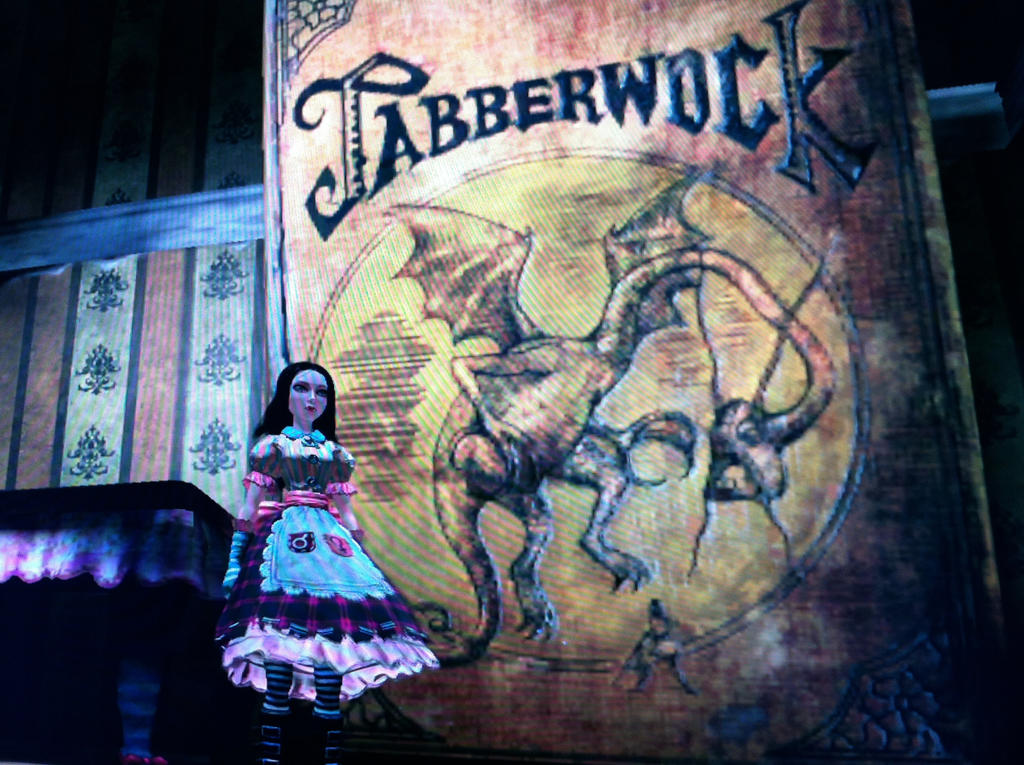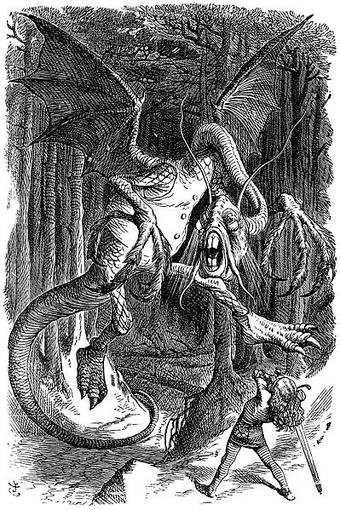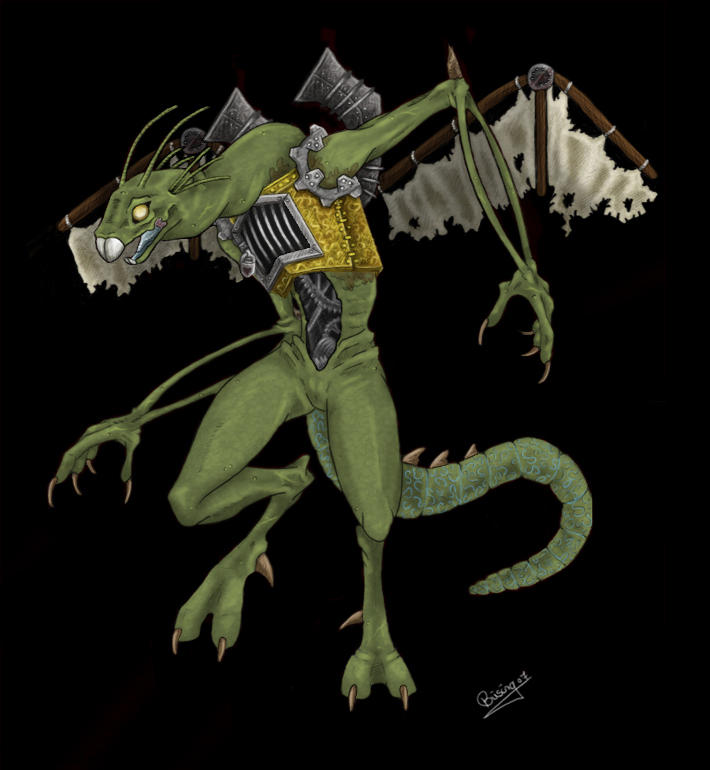http://tvtropes.org/pmwiki/pmwiki.php/Fridge/AliceMadnessReturns
Luckily it's free. American McGee's Alice is a prequel to Alice: Madness Returns. Compared to Madness Returns, this game is a little clunky and dated. After this, the Jabberwock's Eye will.


Alice Madness Returns Jabberwocky
I know that many people want to use this mod for Alice Madness Returns: Mod Little Sister Alice Madness Returns. Sensei-Malfunction 16 7 Alice: Madness Returns - Vorpal Blade BloodOnMyNameBitch 17 5 Floating Alice MetalWing15 6 5 Jabberwock Battle MetalWing15 15 5 Alice and Cheshire xXKitsune 75 9. It is the haunting image of the Jabberwock that lures Alice back into Wonderland and it is there, in the midst of his wicked skull, where she finds her signature weapon, the Vorpal Blade, once more. Out of the previous Jabberwocks that I’ve reviewed, and including those still in the waiting, this is the one and only Jabberwock of the bunch that truly fits the monstrous role to me.

Go To
- You'll probably scratch your head in bewilderment the first time you try to jump over a column of fire and get scorched to high hell. However, Alice was in a house fire and got burned badly. She'd know how Convection Schmonvection works and Wonderland reflects that.
- You might wonder why the Hatter is so mad as to force a tea party when his realm is falling to pieces around him. Then you might rememeber Jabberwock's accusations against Alice in the first game, and it makes more sense.
- Then there's the fact that the game dodges giving you a proper boss fight until the end. When you realize the game's arc words are 'What have you done?' and the answer is 'Nothing at all against the man that raped your sister, killed your family and pimps your bedmates' it begins to make sense. Alice finally gets a boss fight against the Dollmaker around the same time she actually physically stands up to and defeats its counterpart (Bumby). While all of the first game and most of the second take place in her mind as she battles demons of her own devising, this represents the first time we see Alice's determination and confidence from Wonderland bleed over into London. And bleed over it does, into Londonland. It's actually a fairly optimistic ending.
- It may take a playthrough or two, but sharp-eyed players may notice that landscapes in the Victorian 'real world' seem to inspire the landscapes of Wonderland, some subtley, others blatantly: the horizon of smog-belching factory chimneys (as seen from the top of Nurse Witless' house) inspires the Mad Hatter's Domain; the ice-cold warehouse inspires Tundraful; the docks are a pretty obvious influence on the Deluded Depths, with the Mangled Mermaid's prostitutes becoming the dancers at the Carpenter's Theatre; Radcliffe's oriental themed house is downright blatant in shaping the Mysterious East; the police station almost automatically gives way to the dungeons of the Red Queen's palace. Of course, the last few levels surprise the player by reversing the whole equation; after being transformed into a doll in the Dollmaker's lair, Alice awakens to find herself right outside Dr Bumby's house, which inspired the Dollhouse. But, an interesting thing to notice is that Vale of Tears has no real equivalent in the real world; it's part of the original Wonderland, mostly uncorrupted by the Ruin and Dr Bumby's brainwashing, at least until it becomes the Vale of Doom... and fittingly, when Alice finally destroys the Dollmaker and kills Bumby, the landscape of the Vale of Tears dominates the merged Wonderland and London.
- The visual difference between Reality Alice and Wonderland Alice may initially be of how she chooses to perceive herself as, but in the case of her hair, once you've gone through the Madness Returns storybook prequel it reveals what happened to her hair anyway.
- The reason the Big Bad manifests itself as a train; it's actually a train of thought, specifically the one Dr. Bumby's implanting in Alice's head to Mind Wipe her and turn her into his corrupt whore.
- Why the Jabberwock isn't back for this game unlike the Queen? Because the Train made his presence useless, just like in the Queen's case.
- The reason why the Queen is back despite The Dollmaker taking her role is because she doesn't represent Alice's madness but her repressed memories about Lizzie's rape and murder, which explains why Alice calls her '[her] Lizzie'. It would explain why she hates The Dollmaker: he's the man that killed the original Lizzie.
- Also, the Train is trying to destroy Alice's memories of the fire. As it represents her guilt about the fire, the Jabberwock might have been killed by the Train before the game began.
- On this point, the Jabberwock is dead before the train is 'built' in the Hatter's Domain, but the train's influence is felt before that, and the Mock Turtle went to sea before the game begins, but after the train replaced his. This may lead to another point of Fridge Brilliance: that the train was not spawned by something in Alice's mind.
- In one of the first three trailers, Alice is talking to Dr. Bumby, and he says 'Alice, tell me of your Wonderland.' and then she opens her mouth and blood and teeth fall out. In dream interpretation, your teeth falling out indicate that the words you're saying should have stayed in your mouth.
- The black sludge of the Ruined enemies and the Dollmaker could actually be coal tar: it can burn Alice, hardens in a brittle substance when the enemies are killed and it's related to trains... and the story does take place in Industrial Revolution London.
- It is hinted to be at least partially inspired by the flammable chemicals used in her father's photography, but it is more likely something a train would spew.
Advertisement:
- The reason why the Queen is back despite The Dollmaker taking her role is because she doesn't represent Alice's madness but her repressed memories about Lizzie's rape and murder, which explains why Alice calls her '[her] Lizzie'. It would explain why she hates The Dollmaker: he's the man that killed the original Lizzie.
- May also double as something of a Shout-Out. The Hattress outfit, one of the DLC dresses, is the only outfit where Alice has short hair. Why? Because in the original book, the first thing the Mad Hatter says to Alice is 'Your hair wants cutting.'
- In Queensland, Alice's memories about Lizzie start to focus more and more about an squicky suitor. The Queen holds those memories now and wants Alice to realize the truth about her therapist.
- Queensland in the first game was a sprawling nightmare, covered in the fleshy growths of the Queen. In this game, Queensland has become a decaying wasteland full of dead Card soldiers, and the only part close to its old self is in a relatively small area where the Queen herself is residing. It reflects how close Bumby had gotten to making Alice forget about her past, with her memories of noticing Bumby visiting her sister being pushed further down into her mind. That's why the Queen is so insistent about Alice waking up and to actually look at what's around her, as both Alice and the Queen are far too close to being mentally dominated for good.
- Everything happening in Alice's head is a physical interpretation of all the mental instability occurring in the real world. For instance, the Dollmaker aka Wonderland Bumby kidnaps children and perverts them into dolls, things to be played with. In the real world, Bumby brainwashed children into prostitutes - things to be played with.
- May be reading too much into things, but the Geisha statues in Chapter 3 begin as beautiful topless women in sultry poses and crying. That they're crying blood (just like the previous Alice statues) does a damn good job of keeping the player from seeing them as sexy. Fast forward into a later part of the chapter and the statues now sport ant heads. They may still be weeping for all we know, but there's no way to tell and there's no way for them to express their own desperation. Which is exactly what Dr. Bumbly wants in his children. Exposed nubile nymphs who can't go screaming to the police about what he's doing. This is also the chapter where the Caterpillar very pointedly tells Alice that no she doesn't know what's real and 'You let others tell you what isn't!'
- Radcliffe's narration during the Scroll of Destiny segments in Chapter 3 makes it clear that the wasps' cruel treatment of the ants is supposed to be a metaphor for British Colonialism. One term for British people, or people of British ancestry, is White Anglo-Saxon Protestant, or WASP.
Advertisement:
Advertisement:
- It may take a moment to realise, but the children in Dr Bumby's Home For Wayward Children seem to be wearing bibs or aprons in the first London scene. Then you learn what they are. And then you never look at the level the same way. It's so obvious, in hindsight.
- And while they might seem to be identification plaques so an uncaring guardian doesn't need to learn names, pay attention. There are several with the same number. Even close together, like they wanted you to notice.
- In a similar vein, you know those plaques that people hang on their walls to bring comfort? The typical message on those is 'Home Sweet Home' or a similar sentiment. There are two at Houndsditch, but one says 'Home Safe Home' (which may be true, if only relative to the outside world) and, more disturbingly given what we learn, 'EARN YOUR KEEP'. Brrr.
- A bunch of kids in a sidestreet actually discuss their 'work' quite directly and chat about Alice's place in it, yet manage to make it not too obvious for those that don't yet know the twist:
Child A: She ever work?Child A: Too good for company? She don't get close.Child A: Who likes it then?- There is also the pimp in the first London that is trying to encourage her to join his group of whores, hinting on what the local people think she's meant to become.
Jack Splatter: You could make someone happy. Save the world... 10 minutes a time. - The shrinking violets have hands that seem to grope Alice when she gets in them.
- Granted, they also heal Alice while she's in them. A positive thing, so perhaps the violets represent positive physical contact, something Alice would have had little to none of. Even from family, given the time period. Humans are wired to be touched, and Alice is almost certainly touch starved. These violets might be an outlet for those feelings. After all, corrupted and rotten as it is, Wonderland was her dream world once.
- In the final chapter, it's increasingly difficult to tell just how much of it is happening in reality and how much is just in Alice's head, right up to the end where Alice seems to transform into her Wonderland self, pushes Bumby in front of an oncoming train, and steps out of the railway station to find London merged with a happier, cheerier Wonderland. For all we know, the entire final act may just be a fantasy, as Alice has finally lost all grip on reality, unable to ever leave Wonderland..
- In the earlier parts of the game Alice demonstrates a noted apathy towards the suffering of others in Wonderland, making her a bit of a jerkass hero. Much as she blocked out the suffering of her sister and did nothing to stop the suffering of the brainwashed children around her. As with all of Wonderland, her attitudes have a definite Reality Subtext.
- 'Lost? Shrink to reveal hidden paths.' Shrink. As in, therapy. Get it now?
- Notice how every time Alice goes down a slide, things seem to take a turn for the worst? Insanity is a Slippery Slope, as they say.
- The Dollmaker, in its entirety. Its hands constantly make lewd, innuenduous gestures; its attacks include slapping and pinching Alice and in order to defeat the Dollmaker properly, Alice has to hurt its tongue... its long tongue made out of black, slimy, oozing ruin. Linger on that last one for as long as you think you can without feeling physically sick by the possible implications...